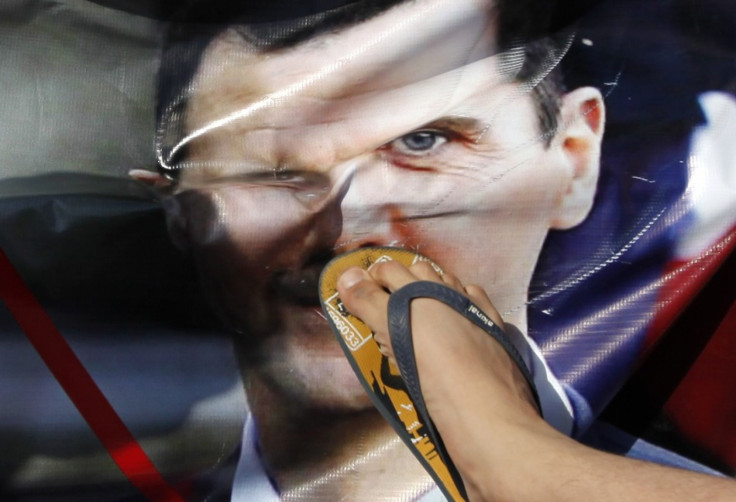Syria's Assad on Crackdown: 'I Don't Feel Guilty'

No government in the world kills its people, unless it is led by a crazy person, Syrian President Bashar al-Assad claimed during an interview on Tuesday.
The statement, logical on the surface, belies months of reports that Assad is waging a brutal, militarized crackdown against peaceful anti-government protestors in the country that his family has ruled for decades. The ongoing Syrian uprising, which began in March, has proved to be one of the bloodiest of all the Arab Spring protest movements, with government forces opening fire on demonstrators, sending tanks into cities, and placing snipers on the roofs of major cities.
Assad told ABC News' Barbara Walters that he is doing his best to protect his people from violent individuals and that he does not feel guilty for his actions.
Every 'brute reaction' was by an individual, not by an institution, that's what you have to know, he said. There is a difference between having a policy to crackdown and between having some mistakes committed by some officials. There is a big difference, said Assad.
There was no command to kill or to be brutal, he added. Most of the people that have been killed are supporters of the government, not the vice versa.
During the interview, Walters showed Assad video of instances where government troops killed civilians and peaceful protestors, which Assad deftly sidestepped.
People went from house to house. Children were arrested. I saw those pictures, Walters said to Assad.
To be frank with you, Barbara,you don't live here, Assad replied.
The interview illuminates one of the most difficult obstacles surrounding the situation in Syria, which is the prohibition on foreign media. State-run news agencies can and will print whatever puts the government in the best light, which allows Assad to quote domestic media outlets. Reporters outside of the country have to rely on reports from activists, another biased source, whose reports Assad can and has refuted.
Still, based on the information it has received, the United Nations says that about 4,000 Syrians have been killed since the protests began in March, a number that many feel is overly-conservative. Additionally, tens of thousands of refugees have fled the country, most of them to neighboring Turkey.
Who said that the United Nations is a credible institution? Assad stated.
As he has done on many occasions, Assad blamed the violence and killings on outside agitators and terrorists, primarily from Turkey, who were trying to destabilize the government. The rhetoric was very similar to that used by Moammar Gadhafi at the beginning of the Libyan uprising.
Assad also added that he was not personally in control of Syria's security force, and so could not be held accountable.
I don't own [the security forces]. I'm president. I don't own the country. So they are not my forces, he told Walters.
Following the ABC interview, the White House was quick to say that it didn't believe Assad's grand claims.
It is just not credible, White House spokesman Jay Carney stated in response to the interview.
The world has witnessed what has happened in Syria. The United States and many, many other nations around the world who have come together to condemn the atrocious violence in Syria perpetrated by the Assad regime know exactly what's happening and who is responsible, he said. I don't think anybody who watched that interview would find Mr. Assad's answers credible.
On Tuesday, the Obama Administration sent the U.S. ambassador to Syria back to Damascus after removing him from the capital two months prior. Ambassador Robert Ford left Syria after pro-Assad protestors stormed the embassy.
Ford has been a vocal supporter of the opposition and has met with protest leaders on occasion, and has urged the Syrian president to end his brutality.
Both Vice President Joe Biden and Secretary of State Hillary Clinton have met with Syrian opposition figures in the past week. Clinton met with exiled activists in Switzerland to hear their plans for a new government, while Biden spoke with Turkish politicians about resolving the crisis and helping those on the group.
(To) the extent we talked about any 'what-next' steps, there were generic discussions about having to go in and provide some help and possibly economic assistance and stability, not militarily, but helping the Syrians, Biden said after a visit to Turkey.
We're in this to see Assad come down and then determine what would be the most helpful thing for the international community to do to establish stability in that country.
© Copyright IBTimes 2024. All rights reserved.





















